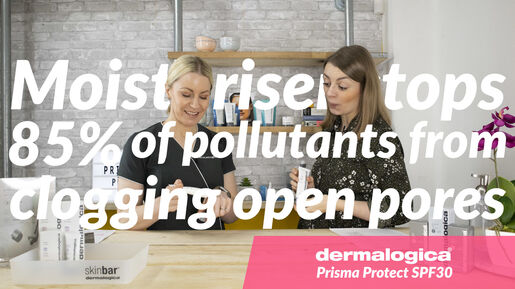
In this video Beth from Jersey Beauty Co interviews Dermalogica’s education executive Victoria. Beth asks questions about Dermalogica’s Prisma Protect SPF 30 moisturiser and how it protects skin against pollution.

In this video Beth from Jersey Beauty Co interviews Dermalogica’s education executive Victoria. Beth asks questions about Dermalogica’s Prisma Protect SPF 30 moisturiser and how it protects skin against pollution.
Prisma Protect SPF 30, is a moisturiser in Dermalogica’s daily skin health line. It's designed to really hydrate the skin in a light to medium consistency, so great for all skin conditions. Able to blocks out 85% of pollutants, it really defends skin against the damaging pollution that's out there. As well as, obviously, being an SPF 30, so blocking those damaging UV rays, it also provides really great hydration and natural luminosity as well.
With regards to pollution, you've got invisible gases, you've got tiny little particles of pollution, and these are highly toxic. Not only are we breathing these pollution particles and gases into our body, really effecting negatively our overall health. In terms of skin, these particles can enter through our tiny little pores.
As you can imagine, if you've got something toxic entering the skin, that's going to trigger inflammation. It's damaging the skin, so damaging our skin's barrier, and our cells, and our lipids, and our moisture.
Over time, this can accumulate into signs of premature ageing. So, leading to pigmentation, uneven skin tone, lines and wrinkles, and just general unhealthy skin.
Free radicals are unstable molecules. When you are exposed to pollution and UV actually, the byproducts of damage are referred to as free radicals, and they're ultimately unstable molecules.
In order to stabilise themselves, they will latch onto skin cells, proteins, or lipids within the skin. And then they damage what it is that they've attached to. And that just creates a cascade of damage, really within the skin.
It's basically what is happening with this damage that we're talking about. It's oxidation of cells, cell membranes, for example. So, it's a little bit like, when you cut an apple in half and you leave it, it oxidises, so the oxidative stress turns the skin or the flesh brown. It's kind of just breaking everything down. Yeah, and kind of rusting it as an example.

This is a great city product. Definitely you will have higher levels of pollution, obviously, in urban and city areas. But don't think if you live in the countryside that you're free from it because actually the agricultural industry can deliver a heck of a lot of pollution as well. I f you want to know what the pollution is like in your actual location, if you visit www.skinpollution.com it’s that's a really cool little widget that you can use because literally, the pollution levels will change all the time. They tend to be lower in the morning. They get higher, as obviously, the sun rises and everyone gets busy during the day. But it can depend on what time of year it is, time of day, obviously, where you live.
Yes, while it's not going to directly impact any pigmentation that you currently have, it is about preventing skin damage. So, absolutely, being able to defend against pollution, UV. Those are all things that trigger pigmentaition in the skin. So, definitely preventing it getting any worse.
The first thing is the formula itself. You'll see it's a really nice medium to lightweight moisturiser, in terms of its weight and feel. It absorbs really well and it gives a nice sheer coverage. The product itself gives an invisible shield, you don't feel it. That's what blocks out the 85% of pollutant particles.
And then, we also have in there Japanese Matcha Tea, which is a really potent antioxidant, so that's going to quench the free radicals, stop that oxidative stress. And matcha tea, Japanese Matcha Tea is about 100 times stronger or more potent than green tea, so matcha tea is the new green tea. You can drink it as well. So, if you want to up your antioxidants in your diet as well.
So it acts as a shield, blocking the 85% pollutants. But also, we've got antioxidants in there, which are basically breaking down any damage that just happened.
Firstly, make sure you use an oil based pre-cleanse because pollutant particles are oil soluble. A regular face wash isn't going to kind of lift or clean them off the skin. By using pre-cleanse, which is an oil or pre-cleanse balm if you have dry skin, that oil base cleanses. They will attach and pull those toxins from the pores. Your cleanser needs to be oil based.
And then another product or ingredient to look out for is charcoal.
Charcoal is kind of all the buzz, whether it's a black toothpaste or a face mask. At Dermologica we use activated Binchotan Charcoal. It needs to be activated charcoal. That will help to absorb pollutants and toxins from the skin. So, something like Dermalogica’s Daily Superfoliant. As well as resurfacing the skin, Daily Superfoliant is designed to pull, again, pollutants out of the pores and give a little bit of an antioxidant or anti-pollution shield.
Fancy giving this clever moisturiser a try?
Simply click the link below and discover Dermalogica’s Prisma Protect for yourself!
